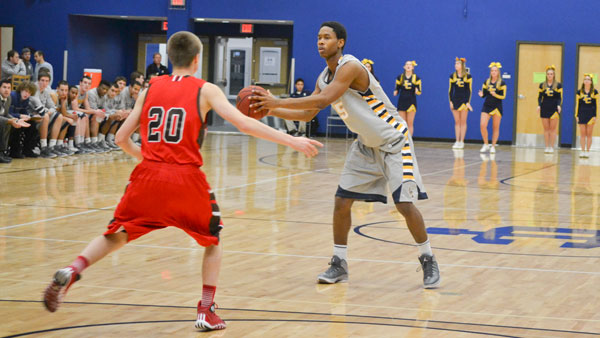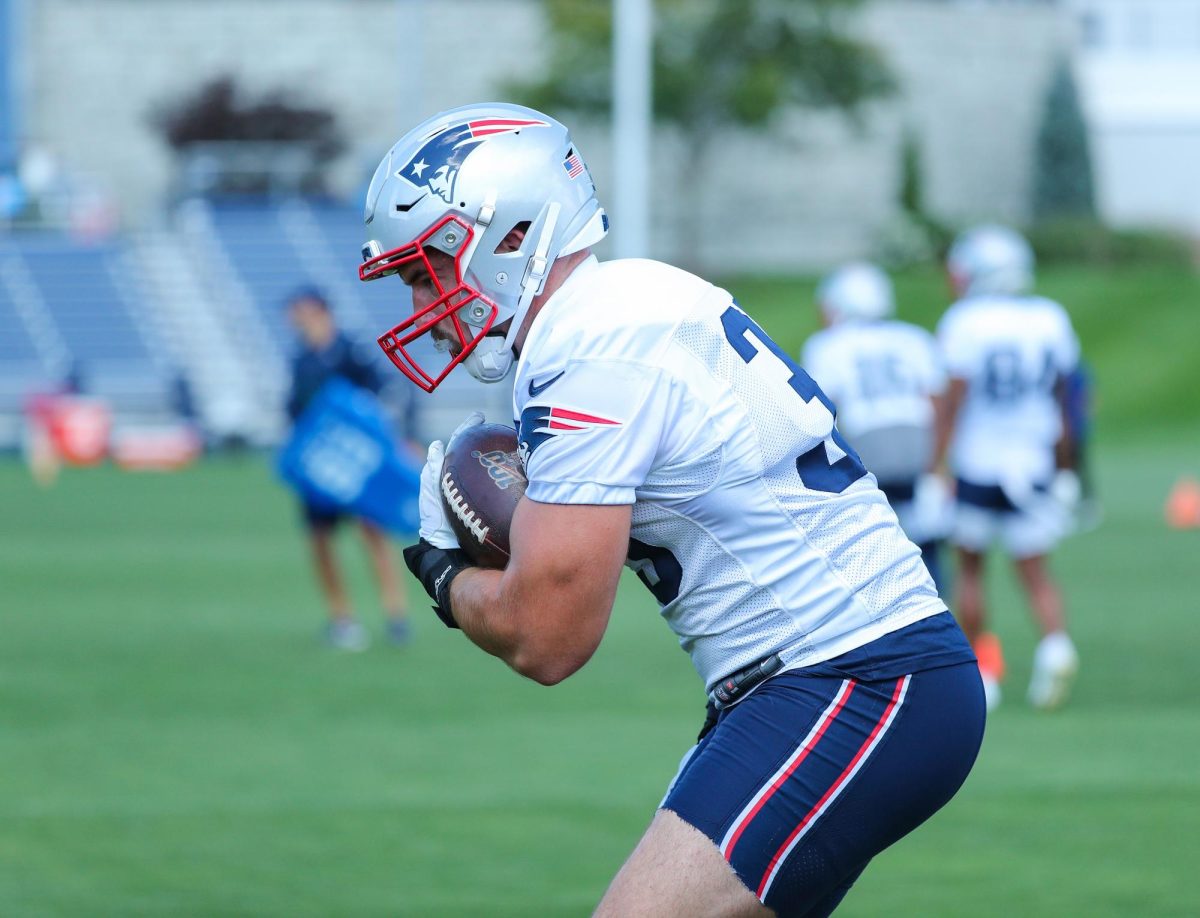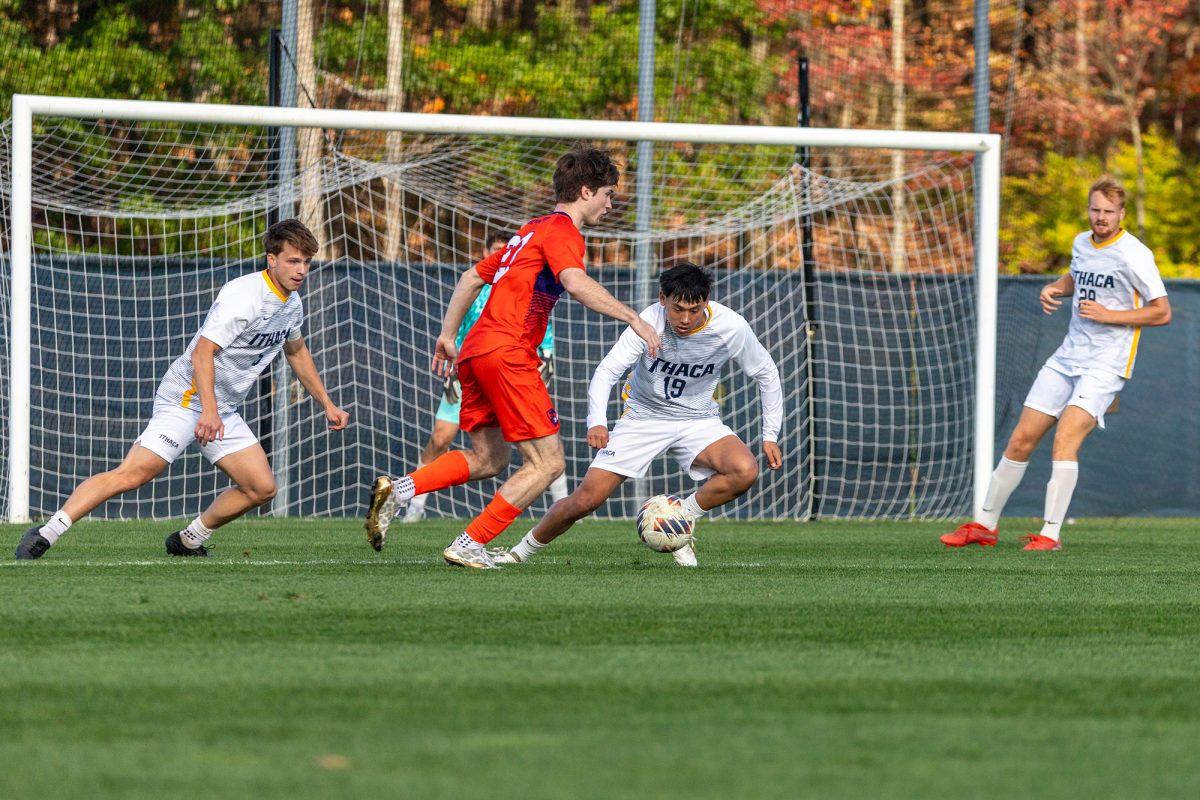Freshman Leonard Davis is a Division III coach’s dream with top-tier talent and a humility rarely seen in a college freshman. As a first-year starter on the men’s basketball team, the 6’9” forward has always had the height and the playing skills, though his life at home hasn’t always been stable.
Davis, a Denver native, began playing basketball in fourth grade. His younger cousin, Jaycee Floyd, was playing on an Amateur Athletic Union basketball team — one of the largest sports organizations that is dedicated to promoting and developing amateur sports — and wanted Davis to play. From that day, basketball was one of the most important aspects of Davis’ life.
His journey up to this point hasn’t been as smooth as the childhood experiences of many of his fellow students. With his mother unavailable to raise him because of a persistent drug abuse problem and his father not being a part of his life, Davis was raised by his grandparents, John Curtis and Emma Sue, until he was 12 years old.
Davis said his upbringing and being raised by someone other than his mother positively shaped his life and has encouraged him to make smart decisions when it came to illegal substances.
“I didn’t really have the rules of today’s society, so I was kind of raised in an old- fashioned way,” Davis said. “I knew coming into college I would be around drugs and alcohol, but because I was raised by elder individuals, along with my past experiences with [my mom’s] substance abuse, I knew that those things could hurt me if I wasn’t careful.”
In 2007, Davis moved to Great Lakes, Ill., for a year when his grandmother became ill. There, he lived with his cousin, James Jackson, and his family. He also attended military school when he was in eighth grade, which provided a more uniform and disciplined lifestyle, Davis said. In terms of basketball, his team lost only one game that season, but a then-6’4” Davis had not yet grown into his body and was not one of the stars of his team.
A year later, Davis’ mom was managing her substance abuse problem effectively and Davis moved back home to be with her in Colorado. Davis explained that he wanted to be home to help care for her and encourage her to stay clean.
“I felt confident in my skills that I had learned in the past year from living with James,” Davis said. “It was up to me to be self-disciplined enough whether he was present or not. I knew that my mom needed someone who was going to be there to support her.”
Once he was home during his eighth grade summer, he continued to play AAU basketball and hone his skills while growing into his body. Davis then enrolled at East High School, an inner city public school located on the outskirts of downtown Denver. With 2,500 students, East has been one of the top 5A basketball programs, which comprise the largest schools in state, for a number of years.
Though Davis never won a state title in his four years playing on the varsity team, he was the only freshman to make the varsity team. Though he only had limited playing time his freshman year, he received national recruiting attention when he was invited to attend the Double Pump basketball camp in Southern California, which is one of the top camps for basketball players seeking exposure to Division I college coaches. Davis said he played well at the camp, and his coaches liked his size as a bigger guard player.
By the end of the camp, Division I schools such as the University of Arizona, Stanford University and the University of Colorado were sending the rising sophomore recruitment letters. Davis, who was a starter his sophomore year, was also the only sophomore in the state of Colorado to be featured in ESPN Rise Magazine as a top-50 player in the state.
Though his recruitment drew hype from multiple Division I programs, Davis had a major obstacle in his way. He wasn’t performing well in school and was focusing more on basketball than on his academics.
Ronald Sally and his wife Yvette, graduates of Duke University and parents of an East High School graduate, founded Project Greer Street in 2009. The program — named after the street that Sally lived on in the northside neighborhood of St. Louis — helps African-American males in the East High School community focus on academics and create options for future success.
Sally’s idea to begin Project Greer Street was sparked by his feeling that African-American males were not academically performing as well as their classmates who are not students of color.
“I was very troubled by what the experience for African-American male students at East High School was,” Sally said. “What I discovered was that there was this array of obstacles for this particular demographic that … had kind of systemically existed, and had grown through years with nobody ever questioning why things couldn’t be better.”
In a student’s freshman or sophomore year at East High School, the faculty at the school identifies students whom they think would benefit from the program. Once a part of Project Greer Street, students meet about every 10–14 days at the high school throughout the year to discuss topics that focus on academic success and life skills development.
Sally said the goal of the program is to provide resources to students at East who were willing to take advantage of an opportunity to have someone support and guide them toward a successful future.
“What we really focused on was the profile of kids that were coming into the door that had demonstrated the potential for academic success,” Sally said. “This is not a program about keeping people out of jail or keeping them off drugs or anything like that — this is really about taking and having the tabula rasa.”
However, when Davis was approached as a sophomore to join Project Greer Street, he wanted nothing to do with it.
“[Ron Sally] introduced himself to me my sophomore year when all of this recruitment was going on, and initially I blew him off,” Davis said. “I just wanted to be a basketball player, but in the end, something just kept eating at me and telling me I should be a part of this group. I don’t believe I would be in college right now if it wasn’t for Ron Sally and his program.”
With the guidance and inspiration the program provided, Davis said he became more dedicated to raising his grades. By his senior year, Davis was the recipient of the Mayor’s Youth Award, which is given out to 30 students between the ages of 13 and 19 who have exhibited leadership and success, even in the face of adversity.
While Davis grew as a student during the next two years of his high school career, a sophomore class of skilled shooters pushed the former starter to the bench during his junior season. Davis’ Division I looks began to decrease because those teams were looking for starters and not bench players.
His playing situation only got worse when Davis tore his meniscus in a game against Minnetonka High School halfway into his senior year. With his chances of recruitment dwindling, Davis sat down with Sally to discuss options of playing basketball in college. Davis sent letters and highlight tapes to Division III schools to expand his opportunity to play college basketball. One of which was Ithaca College, a school recommended by Yvette because of the notoriety of its communications program.
When Bombers men’s basketball assistant coach John Tanous, first discovered Davis, he was impressed by both Davis’ skills on the court and his interest in the integrated marketing communications program. Davis said his career goal is to become an NBA marketing executive.
“From the first phone conversation I had with Leonard, I knew he was a special young man,” Tanous said. “He had a great perspective on life and what he wants to get out of it, and it all started with his education. The conversation had little to do with basketball, and that is what instantly grabbed my attention. When I had the chance to watch him live, I saw that he is a guy who makes the most out of any situation.”
When Davis chose the college, head coach Jim Mullins said he wasn’t only happy to have a player from an elite basketball high school as a part of the college’s basketball program, but he was eager to have Davis because of the player he is.
“The perfect storm in recruiting is when you get a kid who is not only a great player, but you just love him so much and want him to come to school because you think he is going to make your program better just for being in it,” Mullins said. “You think he might be making the school better for coming.”
Mullins said Davis’ greatest strengths on the court are his hustle, energy and athleticism, which make him a versatile player.
“[Davis] is somebody who defends and rebounds, and I really think he could be a stud in those areas,” Mullins said. “He moves his feet, he can guard smaller people because of his quickness. He can guard bigger people because of his length. When he attacks the rim, he goes and gets the ball.”
In the 16 minutes that Davis plays per game, he has averaged about about four points and two rebounds per game in the seven total he has played. His defensive effort has been exactly what his coaches have wanted to see. Both his coaches and his teammates said Davis fits in and has potential to be a leader as he continues his career because he is outgoing, willing to learn and always puts the team first.
As for Davis, he said he looks forward to helping the basketball program thrive and return to the national stage.
“I want to win a national title,” he said. “I am here to be a part of an elite program and help mold a program where kids who don’t play at the Division I level can look forward to going to the school because they know they are going to win games and that they are going to be feared when they step on the court with an Ithaca jersey.”




















